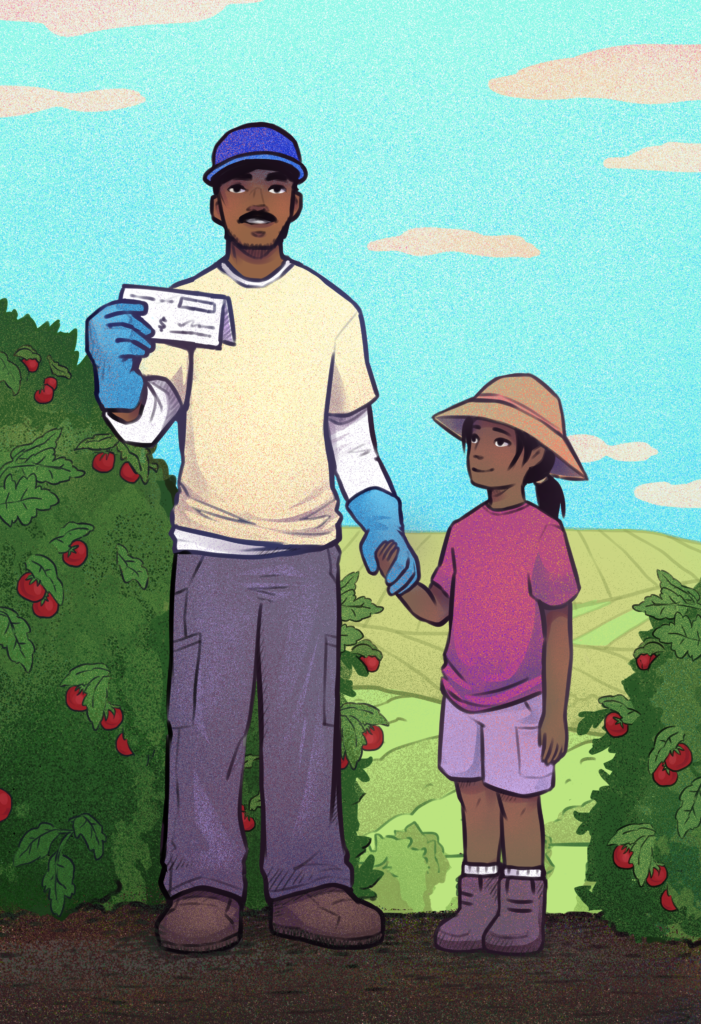
Being paid for the work one does should be a simple and straightforward process. But unfortunately in US agriculture and other low-wage industries, wage theft is an endemic problem that costs a sum total of about $50 billion a year. Worse yet, there are precious few avenues available to farmworkers to claim and receive the money stolen from them by their employers.
To solve that problem, in addition to other longstanding abuses plaguing the agricultural industry, farmworkers rose up in Immokalee’s fields in the 1990s and forged the Fair Food Program. Launched in 2010, the FFP not only protects against wage theft but provides a substantive wage increase in the form of the Fair Food Premium, which is paid to farmworkers under the FFP as a separate line-item bonus in their paychecks.
Backed by the purchasing power of 14 of the world’s largest corporations, the Fair Food Program’s enforceable Code of Conduct contains a set of common sense rules to ensure farmworkers receive each and every penny they have earned with their hard work. As a result, wage theft has been virtually eliminated from farms within the FFP.
To ensure those rules are enforced, the Fair Food Program relies on the generosity of the Fair Food Nation and people like you – a nationwide network of consumer allies known collectively as Fair Food Program Sustainers, FFP supporters who make a regular donation every month, from as little as $10 a month to more than $100. As we gear up in the months and years ahead to dramatically expand the reach of the FFP’s proven protections, the need for your steadfast support and generosity is greater than ever.
If you are able, please consider becoming a Sustainer, so that we can in turn enforce farmworkers’ fundamental human rights, including the right to be paid a fair and decent wage.
Recounting his experiences with endemic wage theft when he worked in the fields — and the importance of the FFP in solving this issue once and for all — the CIW’s own Wilson Pérez shares his story with you today:
My name is Wilson Pérez, and I work here in the Coalition of Immokalee Workers.
Wage theft outside of the Fair Food Program is still quite common. As farmworkers, the work we do means a lot to not just us, but our families as well. We work to support our family back in the countries where we come from. But at the end of a work-week, many farmworkers outside the FFP don’t receive what they are owed for their work.
The truth is that I have had first-hand experiences with wage theft. When I was working to harvest watermelons, I was with a crew where we worked for about a month in Georgia and Florida, but at the end of the job we were never paid for that work – four weeks of work with no pay.
We called the crewleader repeatedly, but he never answered. We then called the farm itself, and they said, “ah no, well, I don’t know, I already paid the crew leader, I don’t know what he did with the money.” That was in the watermelon season. A little later, here in Immokalee with the tomato season, the first 3 weeks that I worked there went unpaid as well.
At that time, before the FFP, crewleaders only wrote your name on a piece of paper when you showed up: you didn’t clock in and you didn’t have a card: they didn’t have a system for clocking in. So you just get there and ask for your check or your payment. It was in cash, so they would say, ‘ah no, well your name doesn’t appear here so you didn’t work these weeks’ and that’s it. And if you call, they wouldn’t answer. Those who were supposed to pay us would disappear and leave with the money you had earned.
These experiences hurt, because it’s hard to know how you’re supposed to pay rent and buy food. I remember when we went to harvest watermelons in Georgia, we carried all our belongings; and we had to sell some of our personal things to be able to return and to pay someone to bring us here, so it’s awful that they don’t pay you for the work you do.
Fortunately, the provisions in the Fair Food Program against wage theft are great help for the farmworkers who can work with dignity, and without needing to wonder if they will not get their pay. More than anything, the Fair Food Program helps the families we have, since we’re able to put food on their plates thanks to our work. Under the FFP, there is zero tolerance for wage theft. Under the Fair Food Program, your pay is secure.
On the other hand, outside of the Fair Food Program, many workers continue to suffer from wage theft, and can’t recoup their money because the crewleaders escape accountability.
As the Fair Food Program expands from 10 to 23 states, sustaining contributions are more important than ever to ensure thousands more workers across the U.S. and beyond can be protected by the power of the FFP in the fields where they work. Become a Sustainer today by signing up for a monthly contribution of $10 or more!
